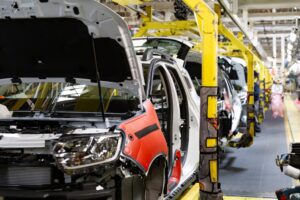Five years after Britain’s departure from the European Union, the UK’s automotive sector continues to prove its global weight, generating £115 billion in imports and exports last year, according to the Society of Motor Manufacturers and Traders (SMMT).
The industry is on track to deliver more than £110 billion in trade for the third year running, despite grappling with new tariff barriers, customs costs, protectionism and geopolitical tensions. Yet the trade body warns that unresolved Brexit complications, combined with looming rules of origin requirements for electric vehicle (EV) batteries, could put this growth at risk.
While global trading patterns have shifted since 2020, the UK remains deeply intertwined with Europe. Last year, £68.4 billion in automotive trade flowed across the Channel, representing almost 60% of the UK sector’s total trade value. More than half of all UK-built cars are still exported to the EU, while the vast majority of new cars sold in Britain come from European factories.
EVs are increasingly driving this activity. Cross-border trade in electrified vehicles has surged by 424% since 2019, climbing from £4.6 billion pre-pandemic to nearly £24 billion in the 12 months to June 2025. Exports of UK-made hybrids and EVs to the EU now outweigh internal combustion engine (ICE) models by two-to-one, while EU shipments of electric cars to the UK – worth £17.6 billion – have overtaken ICE exports for the first time.
That growth, however, faces a cliff edge. Under the terms of the EU–UK Trade and Cooperation Agreement (TCA), tougher rules of origin for EV batteries are due to come into effect from January 2027.
The rules require higher levels of local production of batteries and their components – but the industry says supply chains are not yet ready. Despite recent gigafactory investments in Somerset and Sunderland, and new capacity planned across Europe, battery production is lagging far behind demand.
If the UK and EU fail to adapt the rules, electrified cars, buses and commercial vehicles could face tariffs of between 10% and 22% when traded across the Channel. That would make EVs uncompetitive compared with petrol and diesel vehicles, which continue to enjoy 0% tariffs – precisely when manufacturers are legally required to sell increasing volumes of zero-emission models.
The SMMT has urged the government to work immediately with Brussels to agree a clearer definition for cathode active materials (CAMs), a key battery component whose status under the rules remains uncertain.
It also wants ministers to consult with business and push to re-join the Pan-Euro Mediterranean (PEM) Convention on rules of origin, which would expand flexibility by opening up preferential trade with 14 other countries while easing pressure on the EU–UK system.
Mike Hawes, chief executive of the SMMT, said the UK must strengthen its trading relationships if it is to stay competitive: “Despite the most difficult environment in decades, UK Automotive remains a powerhouse of global trade. But the global trading environment is getting tougher; more competition, more protectionism and more geopolitical tension. Forging closer trading relationships, notably with the EU, and implementing industrial and trade strategies with automotive at their heart will enable us to grow our economy, create thousands of highly skilled jobs, and lead the charge toward net zero.”
Brexit is no longer the only challenge facing the sector, but it has fundamentally altered conditions. Customs requirements, regulatory divergence and uncertainty about future rules have added costs at a time when manufacturers must commit billions to electrification.
With less than 16 months until the 2027 deadline, the industry warns that without urgent political action, the UK risks undermining one of its largest trading industries – and with it, the country’s ability to meet its net-zero ambitions.
Read more:
UK automotive sector drives £115bn trade five years after Brexit

